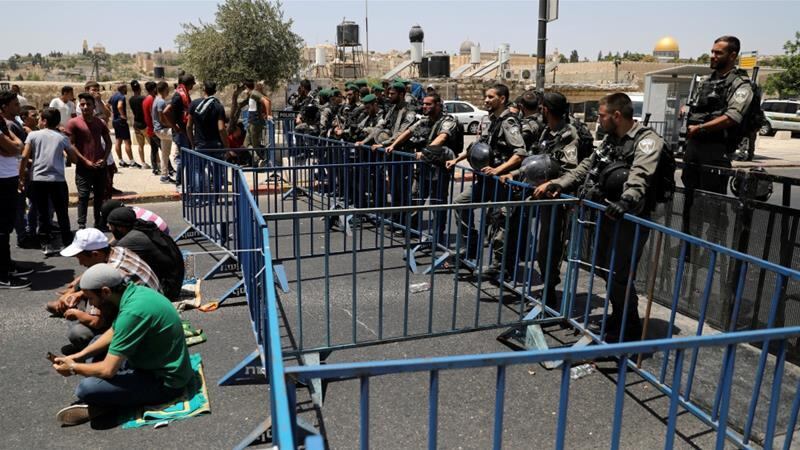The first Friday prayers at Al Aqsa mosque since tensions soared at the site two weeks ago concluded peacefully, but Palestinians remained angered by age restrictions imposed by the Israeli police that kept down the number of worshippers in the compound.
Only men 50 and older were allowed into the mosque compound, while younger Palestinians prayed in nearby streets. Women of all ages were allowed into the mosque.
A police statement said that thousands who had worshipped there “dispersed without any exceptional incidents”.
Elsewhere in east Jerusalem, there were scattered clashes which saw Palestinians throwing stones and police using stun grenades against them, but there was none of the large scale violence that had been feared and it was much calmer than last Friday.
The relative calm could signal the cooling off of a crisis that has raised tempers throughout the Muslim world and strained Israel's relations with Jordan.
Resentment against Israel was still palpable on Salah Al Din Street, the main thoroughfare of east Jerusalem where more than 2,000 Palestinians prayed in the street. Many of them wore caps that said: “I am a Muslim. We sacrifice our blood for Al Aqsa.”
“I am barred because of my age,” said Mohammed Madani, 47. “As long as Israel is barring us, we will continue to pray in the street. If they escalate, we will escalate.”
Tensions have been high since July 14, when two Israeli policemen were killed at the site by Arab gunmen, prompting Israel to install metal detectors and other new security equipment. Israeli police said this was necessary to prevent another attack, but Palestinians viewed it as a step to Israel's taking control of the mosque, the third holiest site in Islam.
Six Palestinians have died in clashes in the dispute and three members of an Israeli settler family were stabbed to death last Friday in an attack inspired by the tensions over the Al Aqsa compound, which is also sacred to Jews as the Temple Mount.
Palestinians boycotted the mosque, staged a sit-in and held prayers in the streets to protest the Israeli measures.
In the face of growing international pressure, Israel dismantled the metal detectors and then the rest of the equipment it had installed and Palestinians celebrated a rare victory over Israel.
But on Thursday, after thousands streamed into the compound for prayers, clashes erupted and more than 100 people were wounded by tear gas, rubber-coated metal bullets and stun grenades, with police saying stones had been thrown at forces in the compound.
This raised fears of major confrontation at the Friday prayers and Israel sent extra police into Jerusalem.
Ekrema Sabri, head of the higher Islamic Council in the West Bank and east Jerusalem, slammed the age limitations, telling The National, "These steps are collective punishment and go against freedom of worship. They want to undermine the atmosphere of victory achieved yesterday."
"We are firm in our position,” he added. "The occupation has no right in Al Aqsa.”
On Salah Al Din street, Yusuf Hamid, 61, said he had decided to join the prayer protest even though he would have been allowed to go the mosque. “I am praying on Salah Al Din Street because I am against the division between young men and old people. They should all be allowed to pray inside the compound.”
In the West Bank, a Palestinian assailant, Abdullah Takatka, 23, tried to stab a soldier at a road junction and was shot dead, the army said. In Bethlehem, clashes erupted outside of Rachel's tomb. The Palestine Red Crescent Society said that 13 Palestinians were wounded there.





